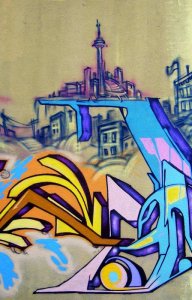
The Pop Culture of Graffiti – Street Art and Graffiti
The actual word, Graffiti, singular graffito; is the name for images or lettering scratched, scrawled, painted or marked in any manner on property. Graffiti is any type of public markings that may appear in the form of simple written words to elaborate wall paintings. Graffiti has existed since ancient times, with examples dating back to Ancient Greece and the Roman Empire. Today paint, particularly spray paint, and marker pens have become the most commonly used graffiti materials. In most countries, marking or painting property without the property owner's consent is considered defacement and vandalism, which is a punishable crime. Sometimes graffiti expresses social and political messages and a whole genre of artistic expression is based upon spray paint graffiti styles. Recently to some it is an art form worthy of display in galleries and exhibitions; to others it is merely repulsive vandalism.
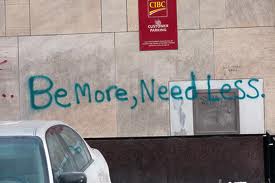 Outsider Art Movement
Outsider Art MovementBoth art forms, street art and graffiti, are a part of the outsider art movement – that being artists with no academic or formal training in the visual arts. Art history has shown us for centuries the progression of the visual arts is moving further away from this elitist viewpoint. In the past art was seen as a technical skill that only a few talented chosen artists mastered. The wealthy commissioned, bought and determined what, was “good art”. Gradually as time has moved on, we have gravitated towards more of a freedom of expression and the brave have taken huge risks towards revealing the question of what makes art, 'art'. A combination of Art History and Art Therapy training has made me questioned this often. I have realized that, art is a visual form of expression, inherit in all of us. Although some art connoisseurs still to this day hold on to their traditional views and disagree. Whoever takes the opportunity to expresses themselves visually may be considered an artist. It's a form of communication that we all interpret differently. During our modern world we see more innovative artists exploring new territories and crossing the boundaries of traditional art. The Art world has veered into the commercial environment as well, used to attract and sell items. Nowadays many professional artists find themselves in the position that they must learn to market their creative work in order to survive financially. These marketing techniques get extravagant and gives more rise to the question, "what is art?"
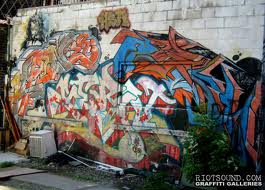
Revolt Against Noise Pollution
Many graffiti artist revolt and make their statements about the commercial world we live in. Noise pollution is an issue in the urban areas and with advertising and branding. This commercial quiet visual pollution surrounds us every day. Some graffiti artists see their creative process as a revolt against visual pollution. The overwhelming billboards and messages that pollute the streets in the city can leave us feeling financially inadequate and helpless at times. Often feeling empty. Some see the street art and graffiti art as a revolt against the arts media marketing. Why must only the commercial world have control of this form of expression and visual dissonance? However, the controversies that surround graffiti continue to create disagreement amongst city officials/law enforcement and graffiti artists who wish to display and appreciate work in public locations. There are many different types and styles of graffiti and it is a rapidly developing art form whose value is highly disputed.
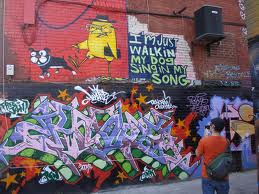
The Growing Appreciation of Street Art
Graffiti has often evolved into a pop culture existence often related to underground hip hop music, b-boying, and a lifestyle that remains hidden from the general public. Graffiti can be used as a gang signal to mark territory or to serve as an indicator or "tag" for gang-related activity. This is not the case for all graffiti art. There is a huge controversy in regards to the evolved graffiti art, stencils, sticker art, wheatpasting / street poster art, and street installations. However, the ‘Street Art’ is typically used to differentiate this new movement from graffiti, vandalism, and corporate art. Many non profit organizations encourage creative self expression among youth and start mural projects among the street to beautify the lower income areas. Often there is a large amount of cross over between the two art forms. For example, in New York City, Spring Street was one of the World’s most known Street Art canvases. On December 15, 2006 the outside and inside of the building, in need of flat roof repair among other things, was opened to the public in one final and mass display / installation of Street Art before the building was cleaned up and turned into apartments. In Toronto there is an increase in the value and the beauty of the graffiti and street art forms as it becomes more acceptable in certain places. Queen Street has it's own beautiful Graffiti alley. The art form is more appreciated if it is respectful of private property. Many graffiti artists realize this and have established rules of conduct with bombing on the streets. Local walking tours such as the Murals and Public Art in the Junction Triangle has organized a free walk in west Toronto that is bordered on all three sides by railways tracks and underpasses, making it an ideal place for public art. This walk on Saturday May 7, 2011 at 10am explores the painted murals, ghost signs, graffiti, and other public art throughout the neighbourhood. It nice to this appreciation, interest and potential understanding for this Outsider art increasing.
The Street is my Canvas, Danger
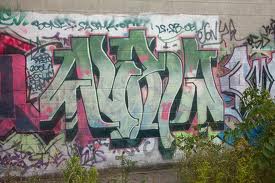 The
graffiti art sub-culture can be very dangerous. Many of these bombers
or artists not only risk being caught by authorities vandalizing insulated concrete forms
of public buildings, but they also risk their lives. The term bombing
is done everywhere and can be as simple as marking. These bombers often
don’t feel like they have a voice in society and this tagging one’s
signature can feel empowering leaving a legacy behind in a place where
you feel ignored or forgotten. Such is the case for 18 year old Bardia
Bryan Zargham in 2005. On a section of the CPR tracks in mid-town
Toronto, the young man was struck by an oncoming train. Bardia Bryan
Zargham was a graffiti artist and he was writing his tag – his graffiti
name – on the side of a stationary freight car when a train hit him. His
tag was Alpha, the beginning of everything. Alpha was known as the King
of the Bombers. He was known to be good at writing his name in big
letters in a few short minutes and then moving on to do it again. This
was a tragedy that graffiti artists must not ignore Rest in peace
Alpha.
The
graffiti art sub-culture can be very dangerous. Many of these bombers
or artists not only risk being caught by authorities vandalizing insulated concrete forms
of public buildings, but they also risk their lives. The term bombing
is done everywhere and can be as simple as marking. These bombers often
don’t feel like they have a voice in society and this tagging one’s
signature can feel empowering leaving a legacy behind in a place where
you feel ignored or forgotten. Such is the case for 18 year old Bardia
Bryan Zargham in 2005. On a section of the CPR tracks in mid-town
Toronto, the young man was struck by an oncoming train. Bardia Bryan
Zargham was a graffiti artist and he was writing his tag – his graffiti
name – on the side of a stationary freight car when a train hit him. His
tag was Alpha, the beginning of everything. Alpha was known as the King
of the Bombers. He was known to be good at writing his name in big
letters in a few short minutes and then moving on to do it again. This
was a tragedy that graffiti artists must not ignore Rest in peace
Alpha.Exit Through the Gift Shop
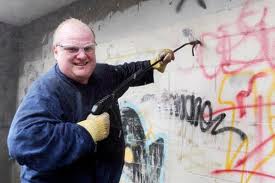
Understanding and research of graffiti art is essential before cities begin to destroy all aspects of it on the streets. The documentary movie Exit Through the Gift Shop is an insightful and interesting view on graffiti or street art. It’s a story of how an eccentric French shop keeper and amateur film maker attempted to locate and befriend Banksy, only to have the artist turn the camera back on its owner. The film contains footage of Banksy, Shephard Fairey, Invader and many of the world's most infamous graffiti artists at work. So many artists have incredible messages. Some have a large amount of respect for the city streets and private property and they have so much they want to share with the public on the street with not recognition or reward received. Living in the city of Toronto I must admit there are times I see these tags or art works and I am repulsed; however, more often I feel a great amount of joy and appreciation for creative work involved, including their colourful beauty. I recognize that I feel these contradictory emotions in an art gallery as well. Art evokes emotions. Graffiti is part of our modern day urban pop culture and has it's own value of art accessible to all. It would be a shame to have all of this expressive art eliminated from the streets in Toronto. I relate it to music, and feel it has a place on the city streets and not just galleries and cafes.

